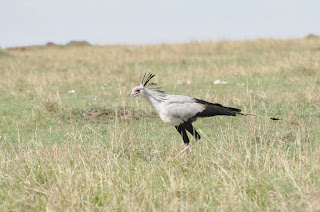On the visit to the reserve, the sheer size
and grandeur of these rainforest trees, some over a hundred years old, is
impressive. The trees create a complete environment for the birds, insects,
butterflies and wildlife – so plentiful in the area.
It also presents a real tropical rain forest
experience with fascinating encounters of Africa’s greatest hard and soft woods
such as; Elgon teak, red and white stink woods and several varieties of Croton
and Aniageria Altisima.
Walking beneath the lush forest canopy, the
deep shade is pricked by flashes of color, exotic birdcalls, and the scents of
wood, flower and moss while along the tracks; splendid orchids sit amongst the branches
of the larger trees. The walk to Buyango Hill, the highest point in the forest,
is a must for visitors. There are 7 kilometers of trails.
The best, and pretty much only way to tour
about the Reserve is by foot. You can choose to venture out on your own both
night and day, or can opt to hire a guide. The advantage of hiring a guide at the reserve is that they are
officially trained, and it can be somewhat easy to get lost here, though a
pretty good system of signs does exist. The guides can also help you identify
different animal and plant species, as well as tell you a little bit about
them.
The Reserve is twice the size of Nairobi
National Park with 380 species of plants spread in swamps, riverine and
hardwood forest areas, glades and the shallow forest around the edge of the
reserve.
Over 350 species of bird have been recorded
including rare snake-eating birds. Butterflies and snakes normally only found
in West Africa can also be seen, although visitors need have no concern about
meeting them round every corner. Forest mammals include bush pig, grey duiker,
civet, Sunni, clawless otters and some fascinating nocturnal game not to
mention ground Pangolin, porcupines and the occasional leopard.
Kakamega forest offers excellent primate
viewing – Black and White Colobus are plentiful and the De Brazza Monkeys
(known as 'Karasinga' in Swahili, thanks to its distinctive white beard) can be
found in the adjacent Kisere forest area. Many rare species of primate are
common here such as the Blue Monkey, frequently seen near the Ishiuki Falls,
the Olive Baboon and the Red Tailed Monkey.
Unlike the renowned safari destinations in
Kenya, the Kakamega Forest is not home to a big number of large animals;
instead birds, insects, and reptiles are the most abundant. Nature
photographers and birdwatchers will relish in a visit to the Kakamega Forest
Reserve, and it's really an ideal destination for anyone who enjoys eco-tourism
on the whole.
Should you include a visit to the Kakamega
Forest during your Kenya vacation, you will be treated to a landscape and
environment very unique to the area, which is a great compliment to the other
amazing regions of the country.
Karibu Kakamega!
Peter K.
Philip
Adventure Kenya camping safaris,
Natural
Track Safaris



No comments:
Post a Comment